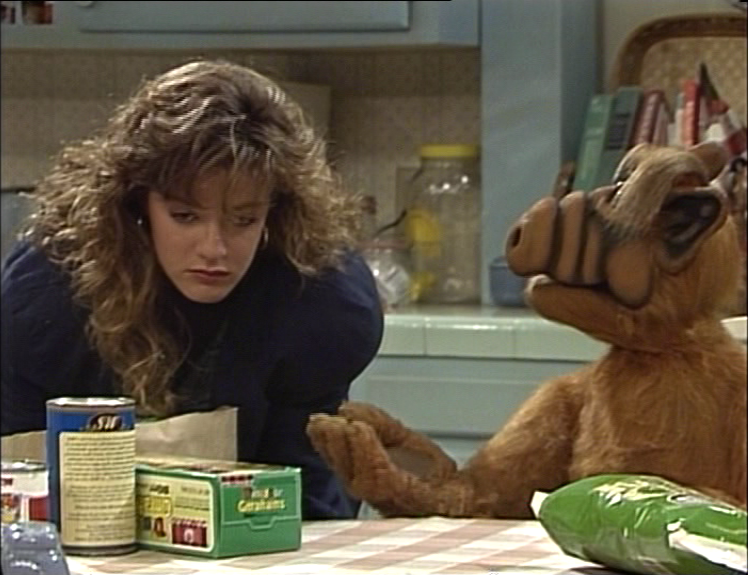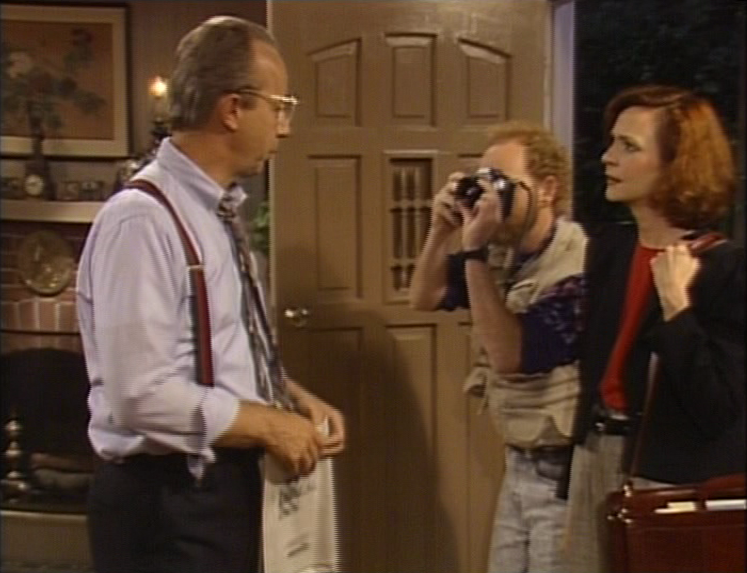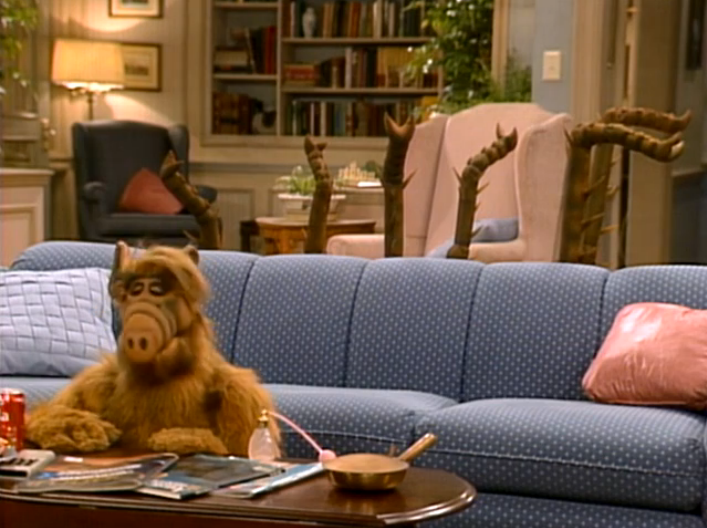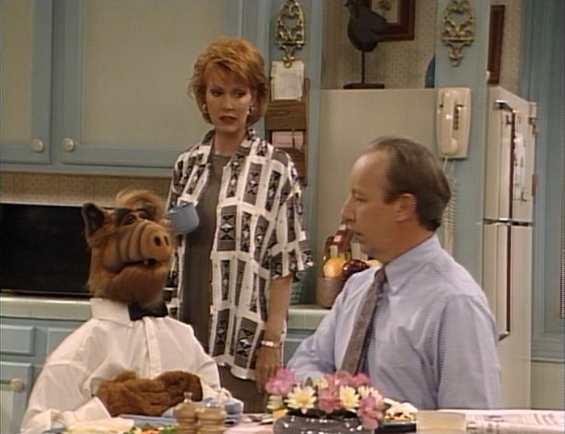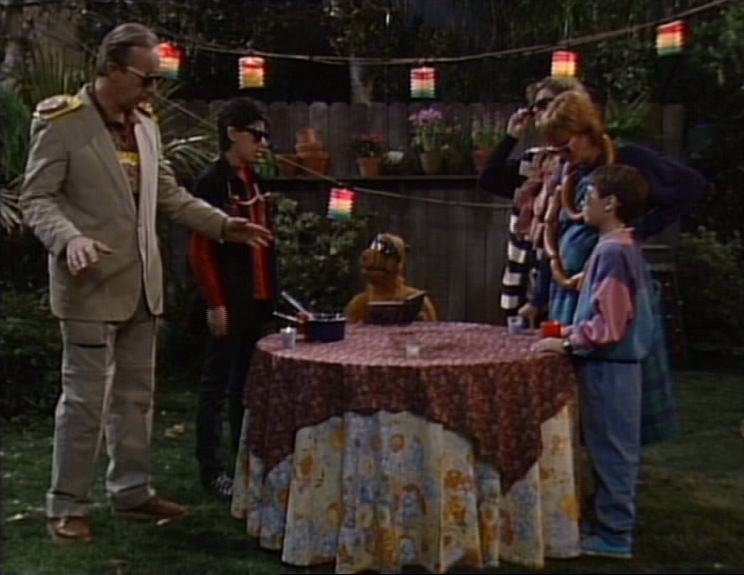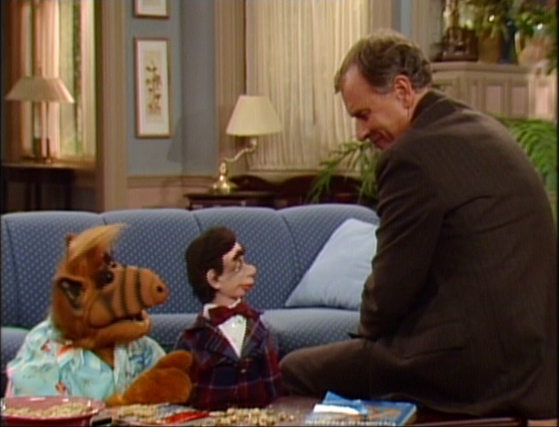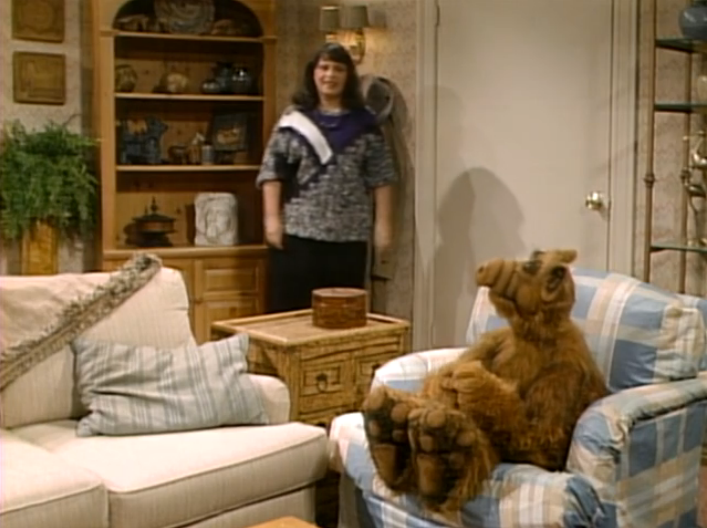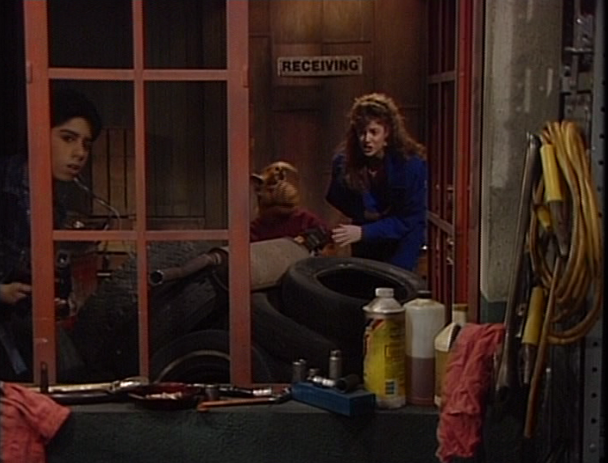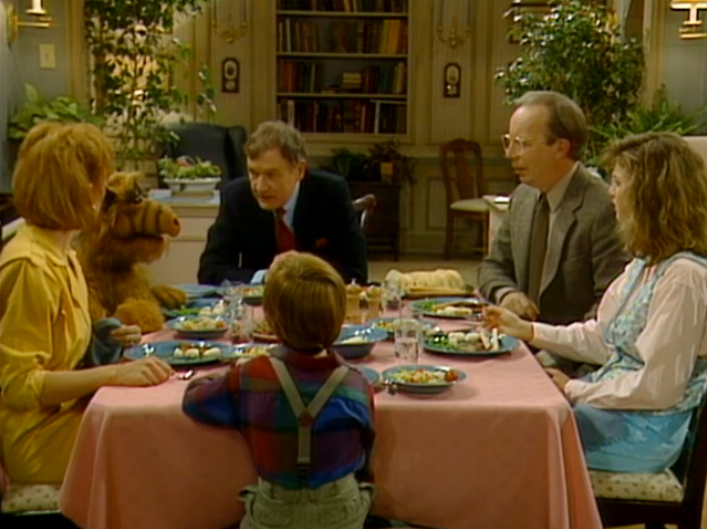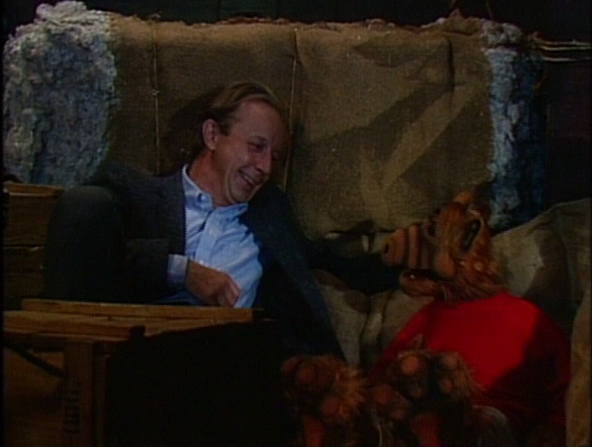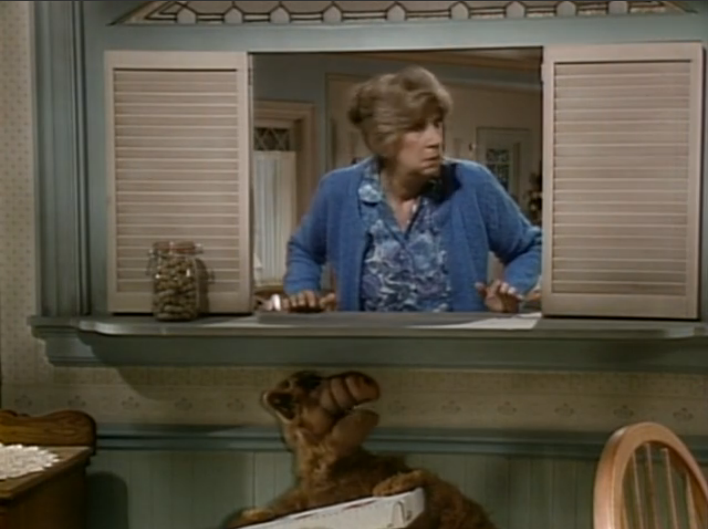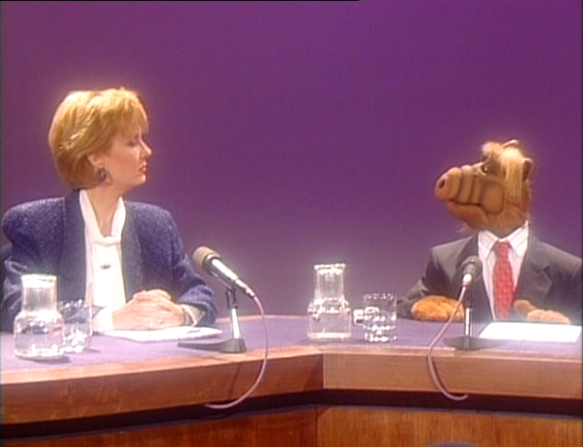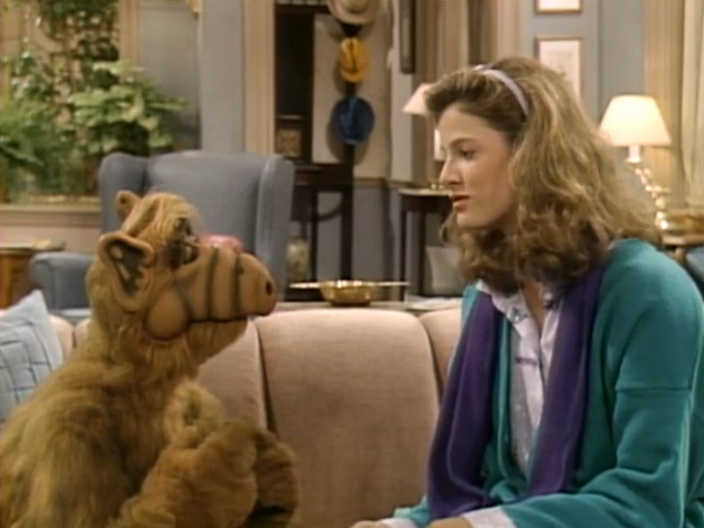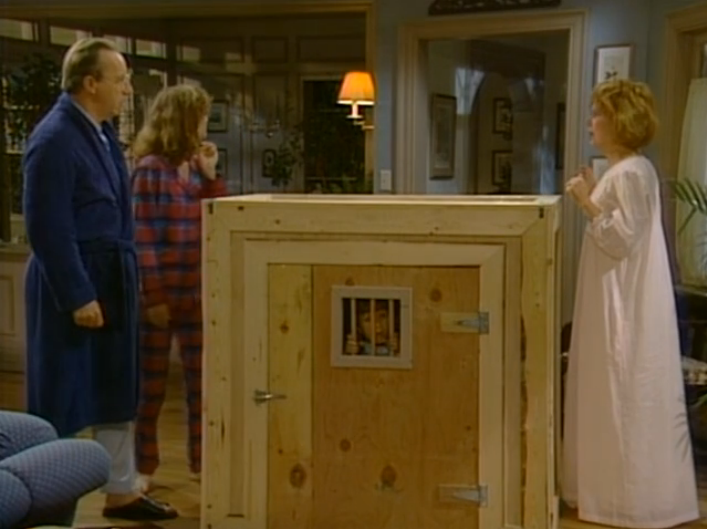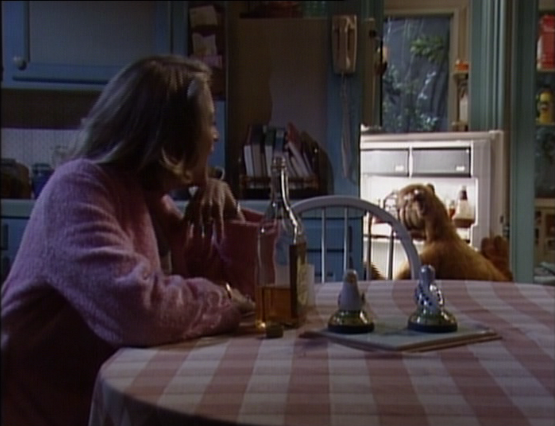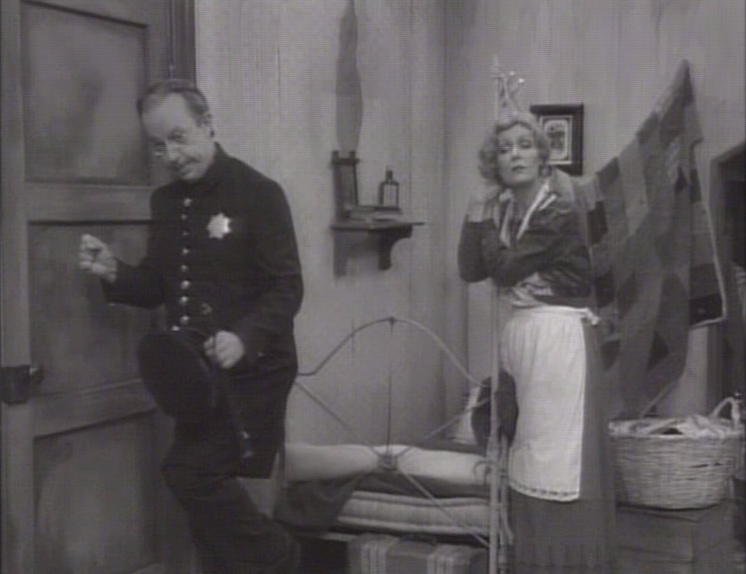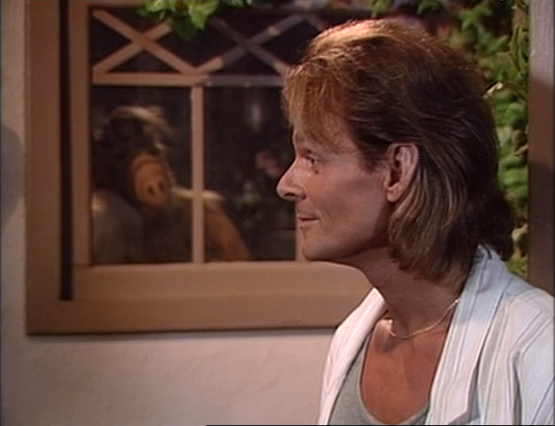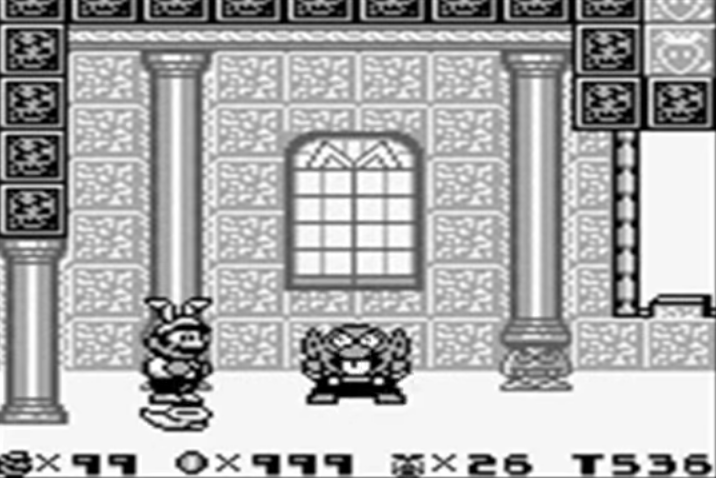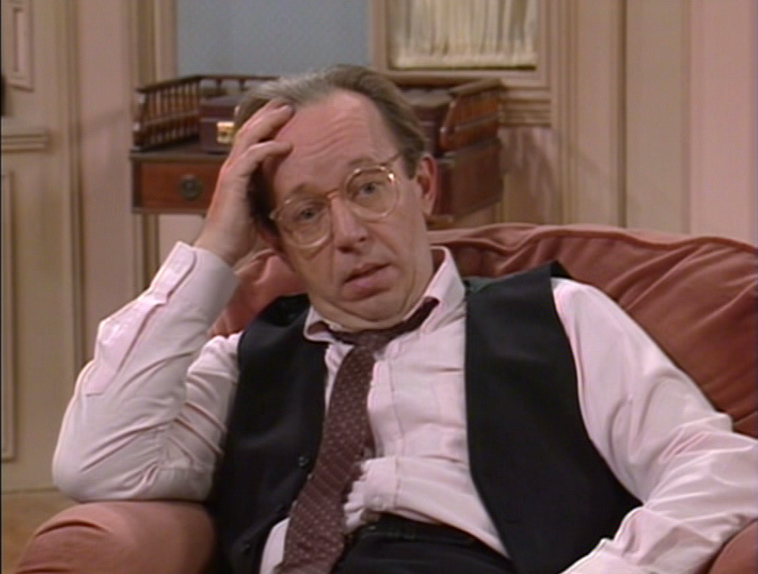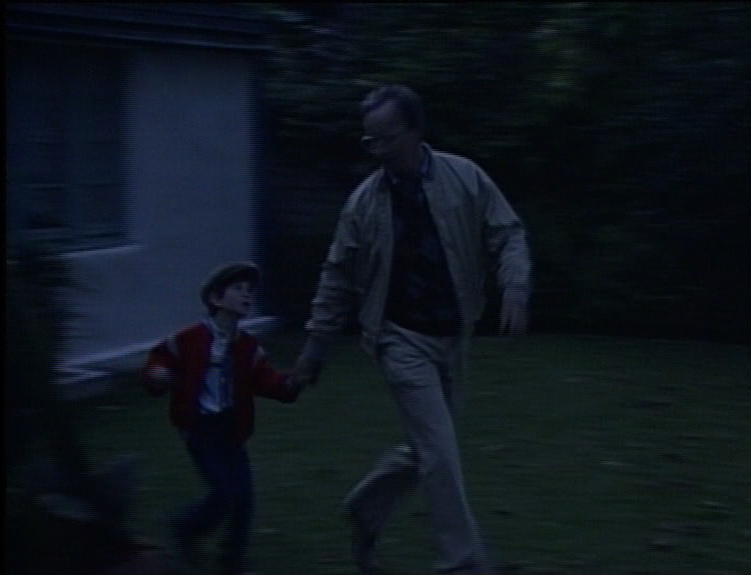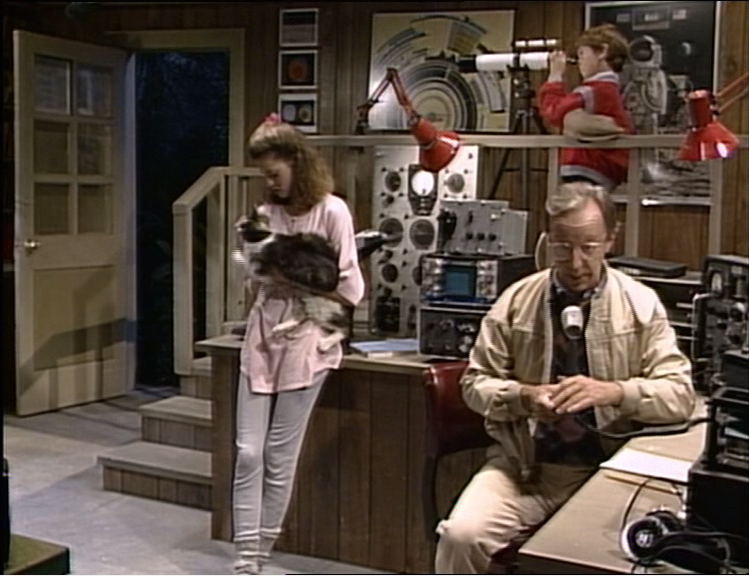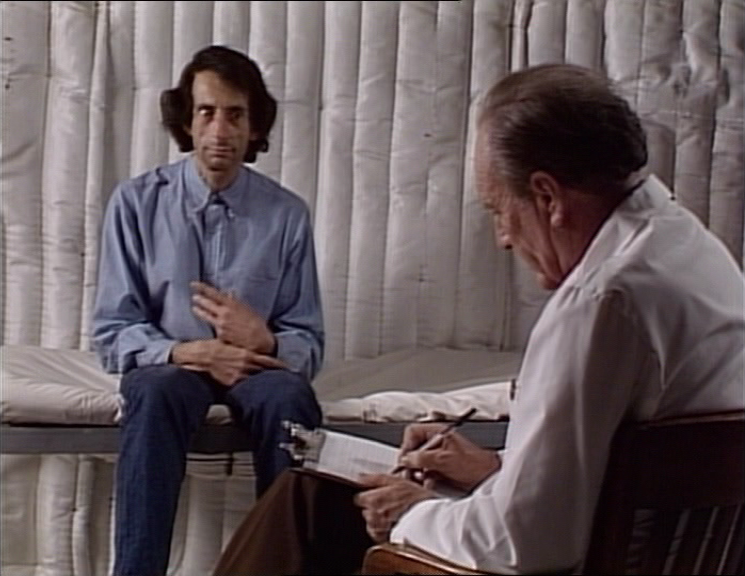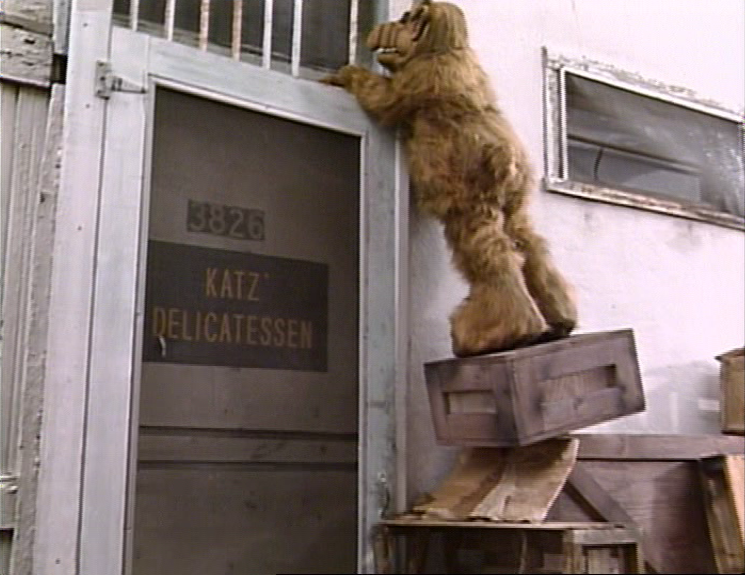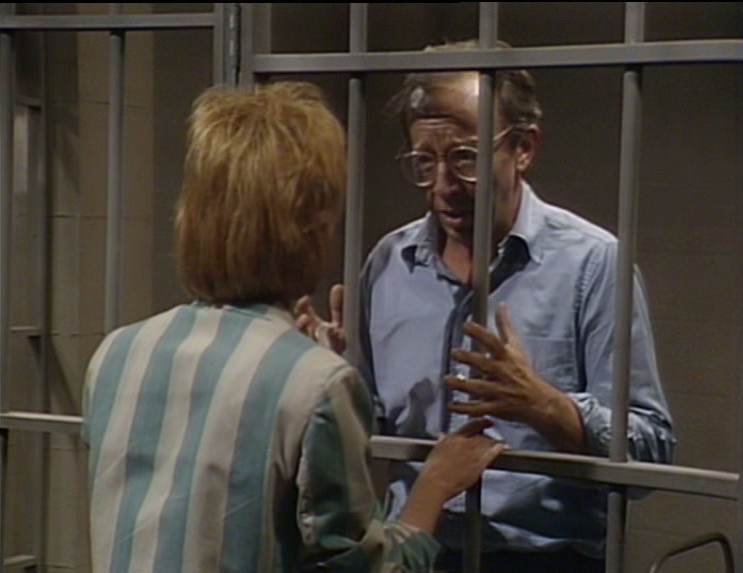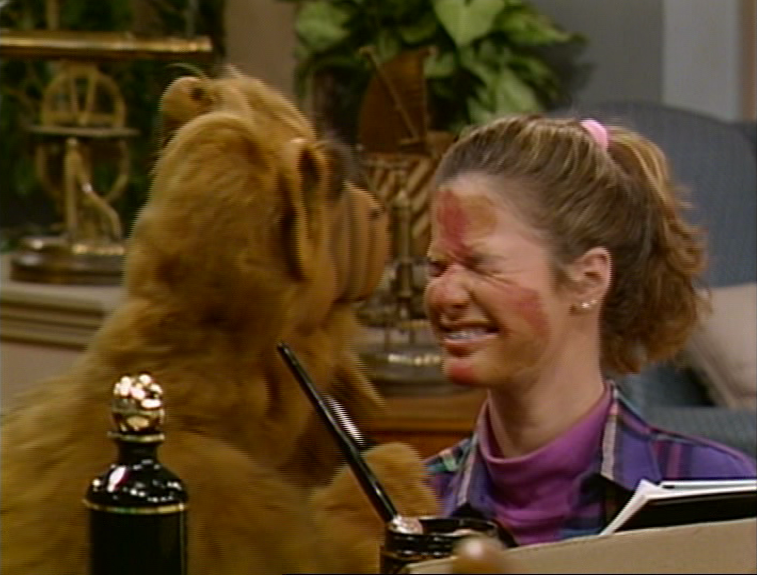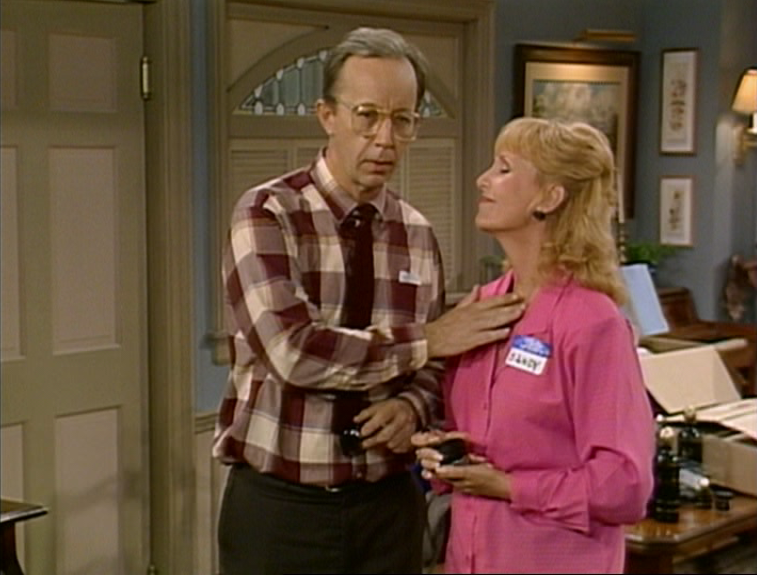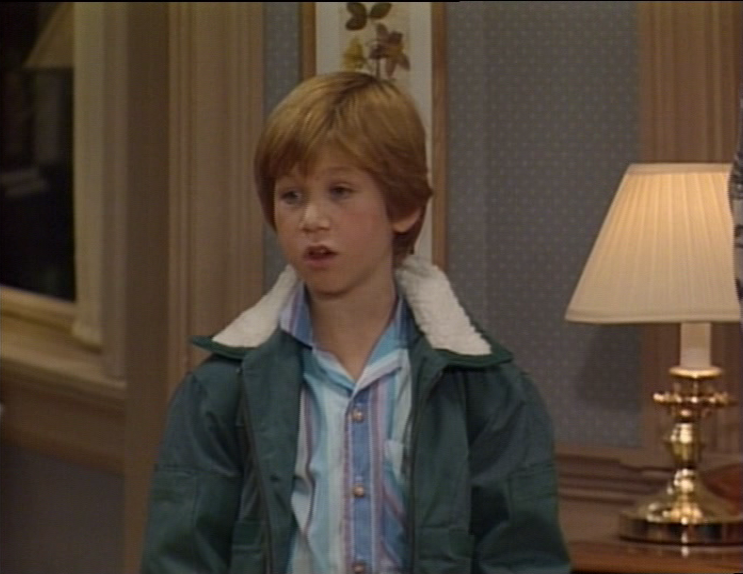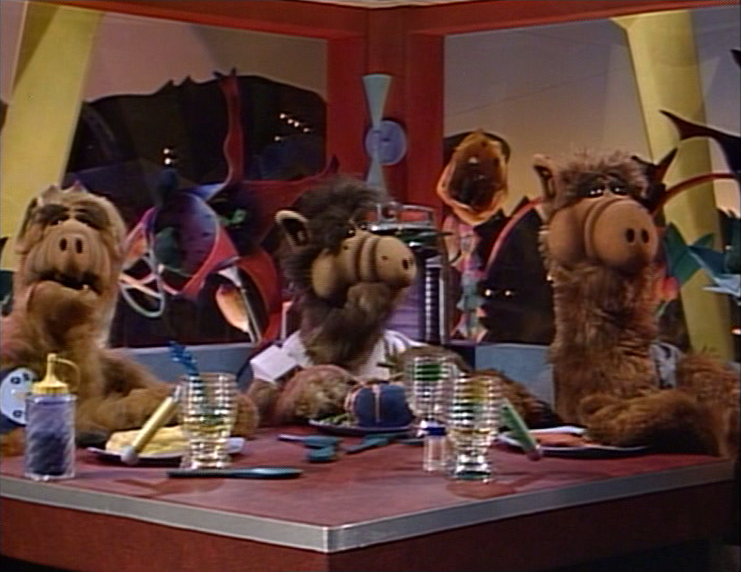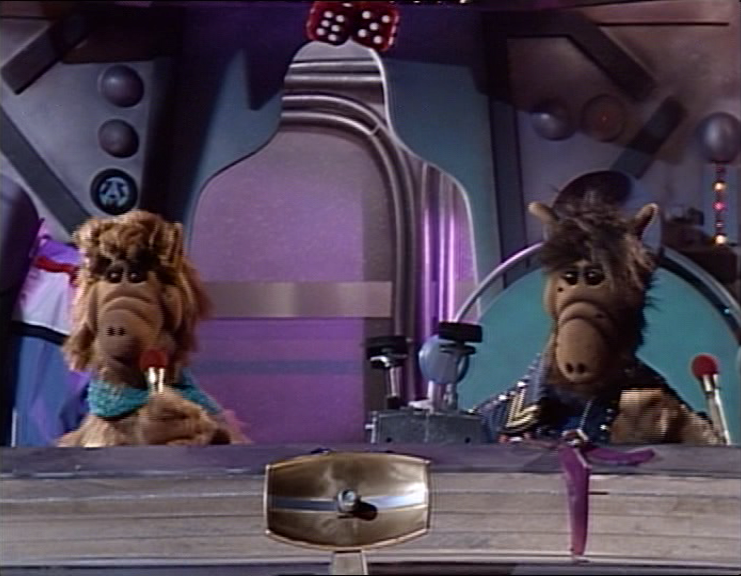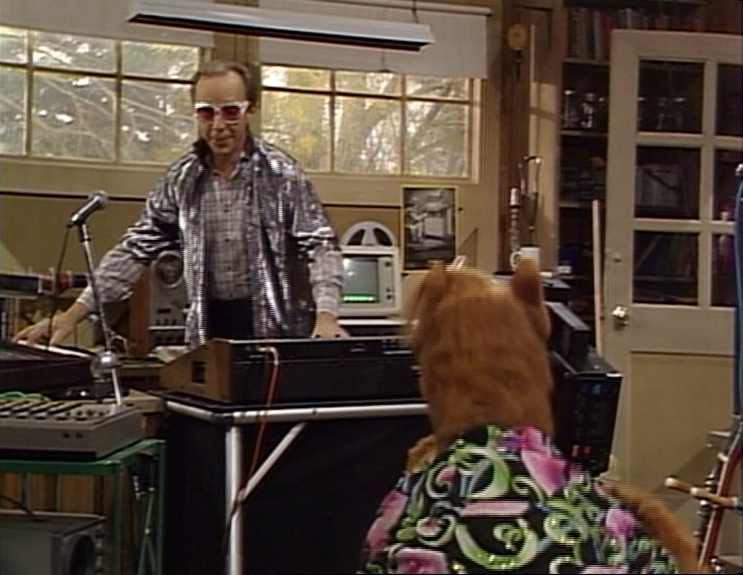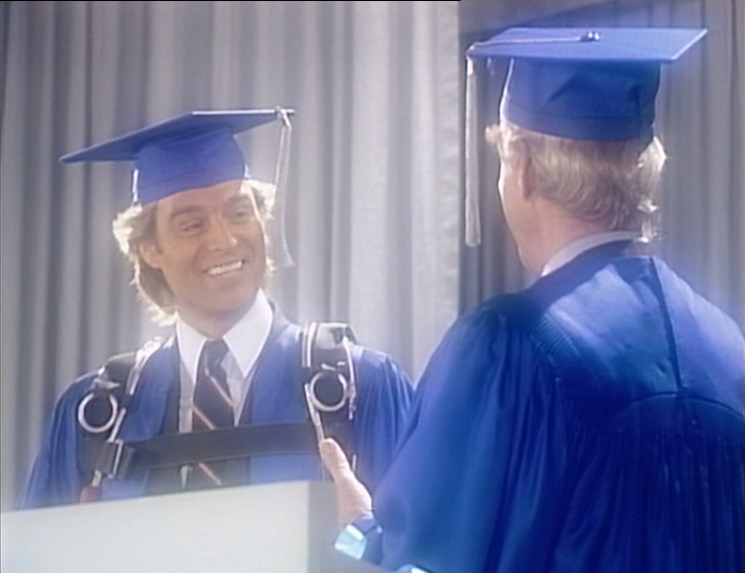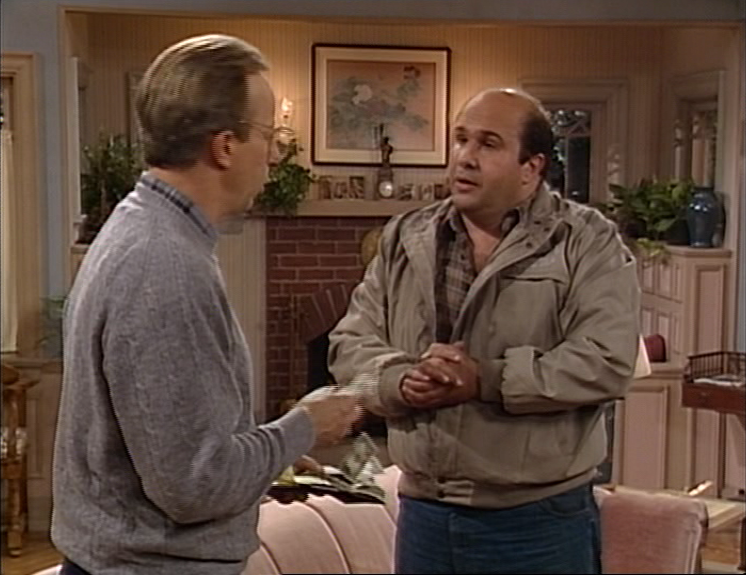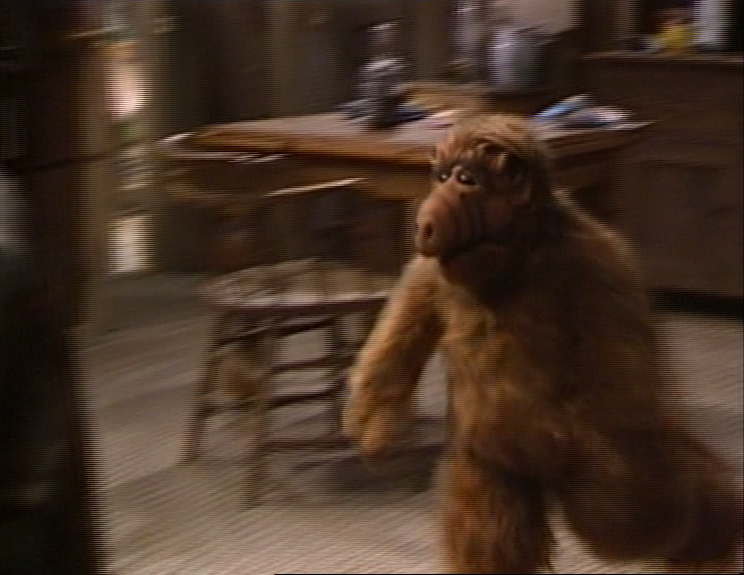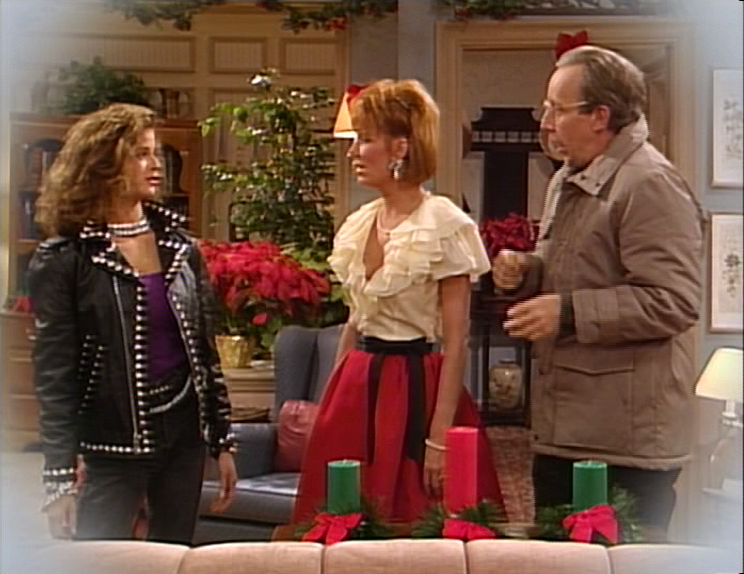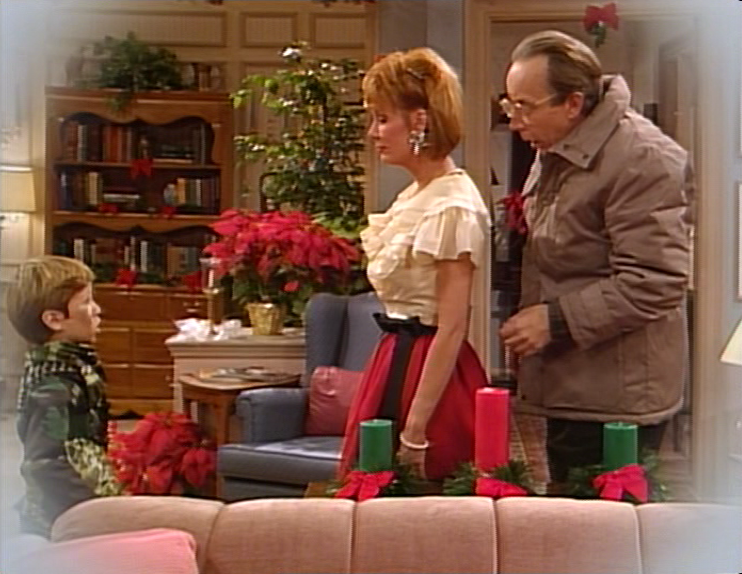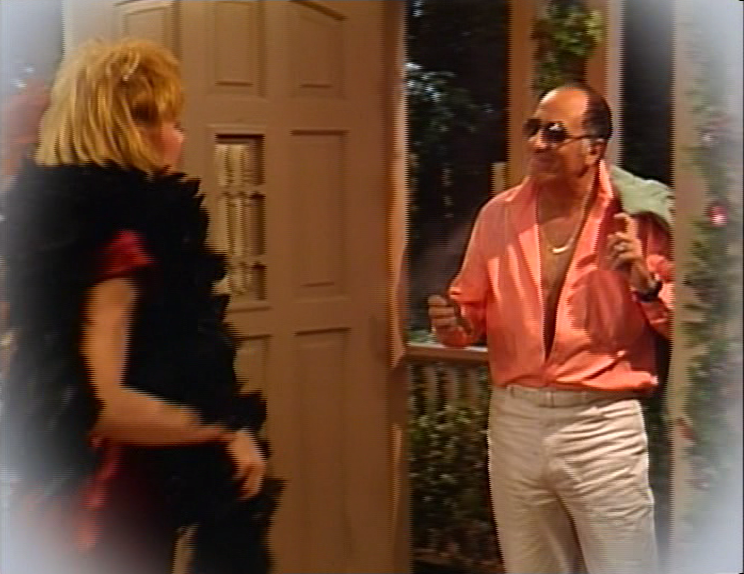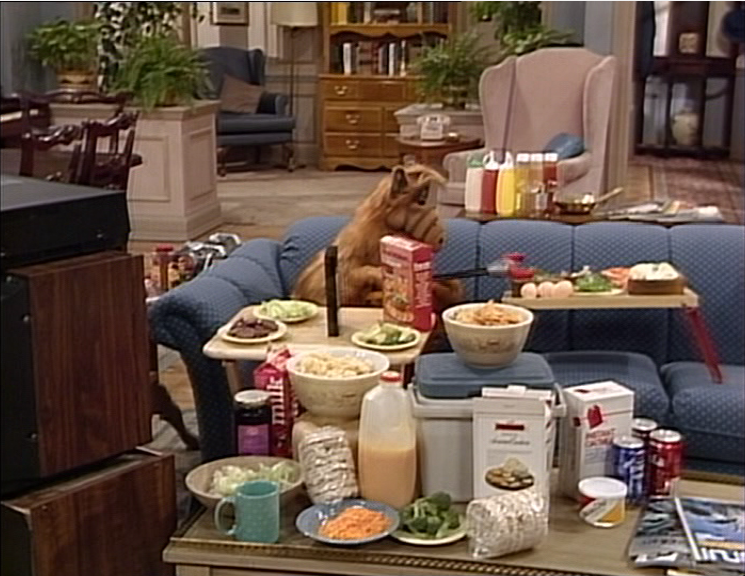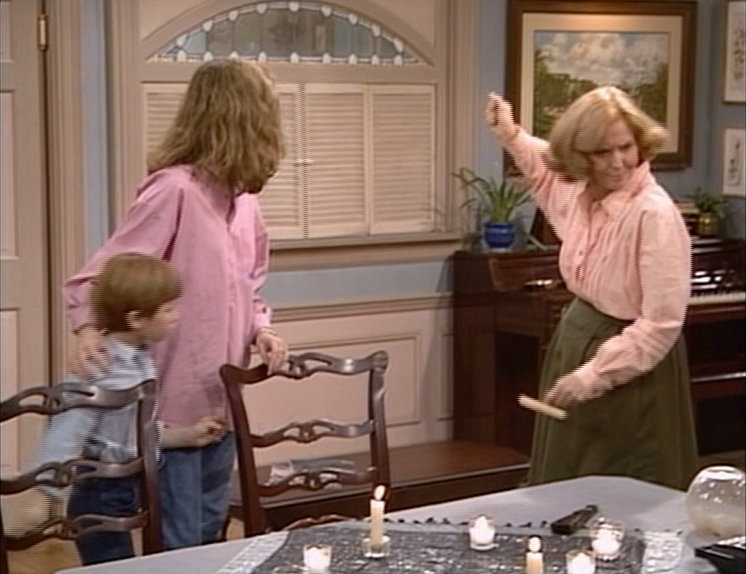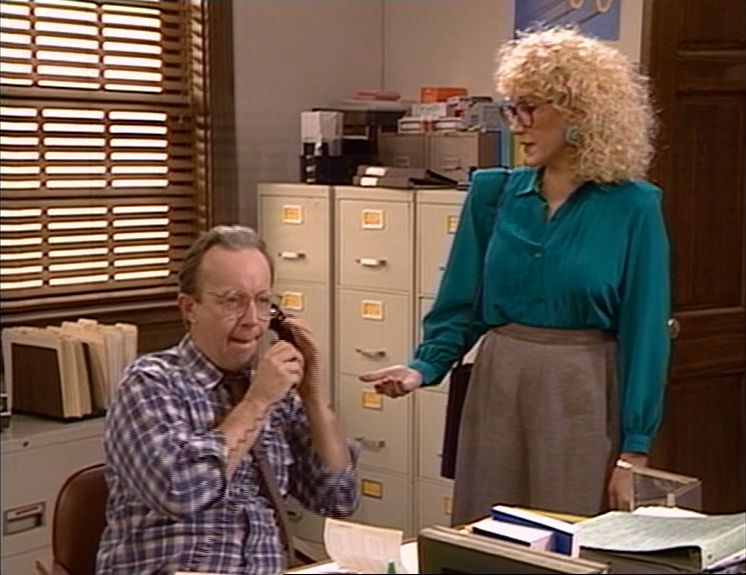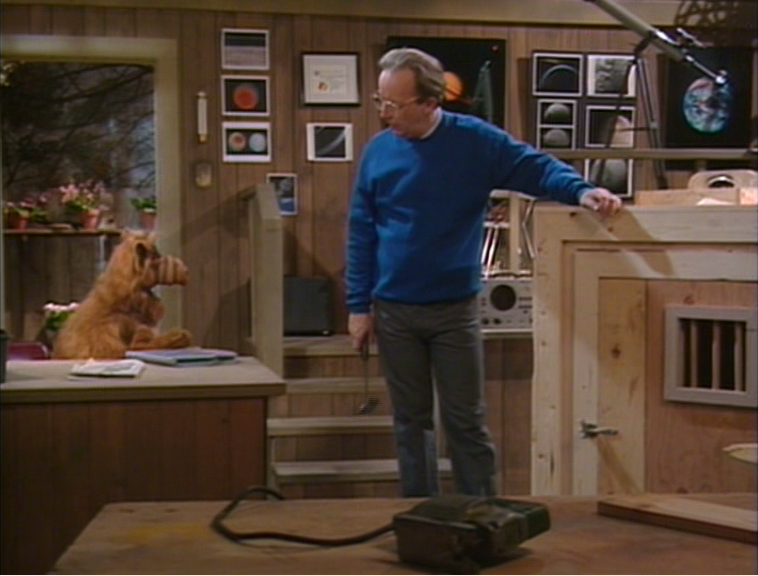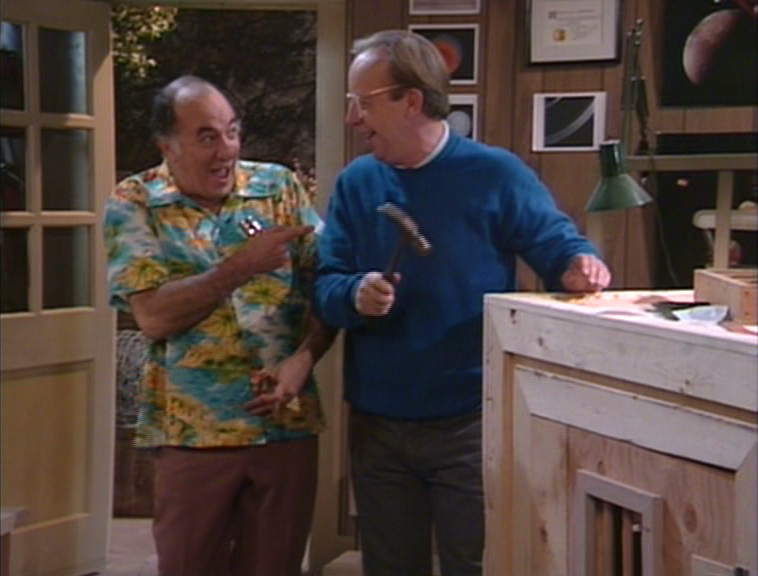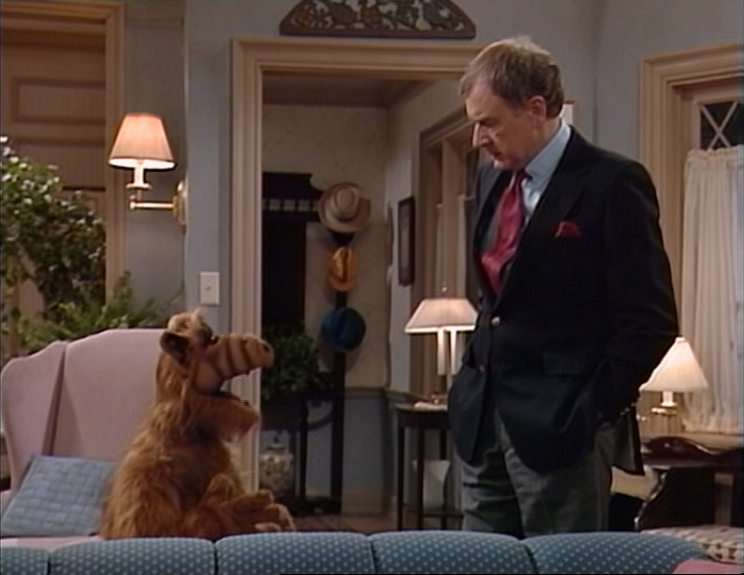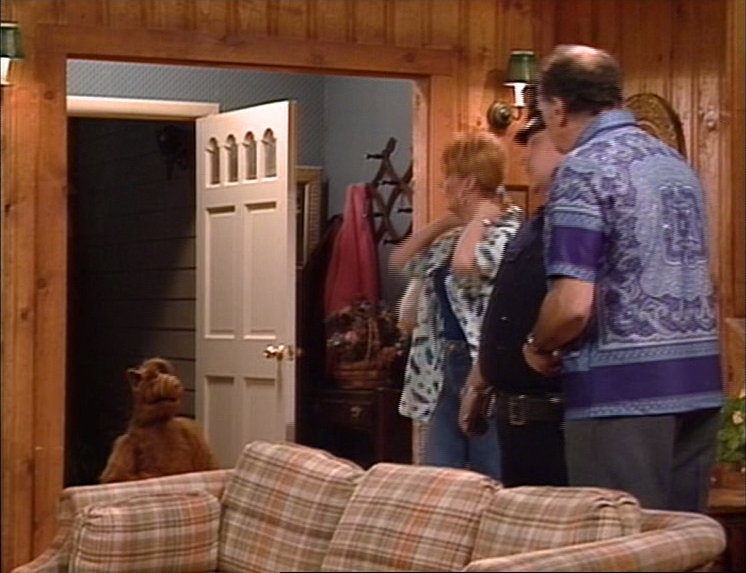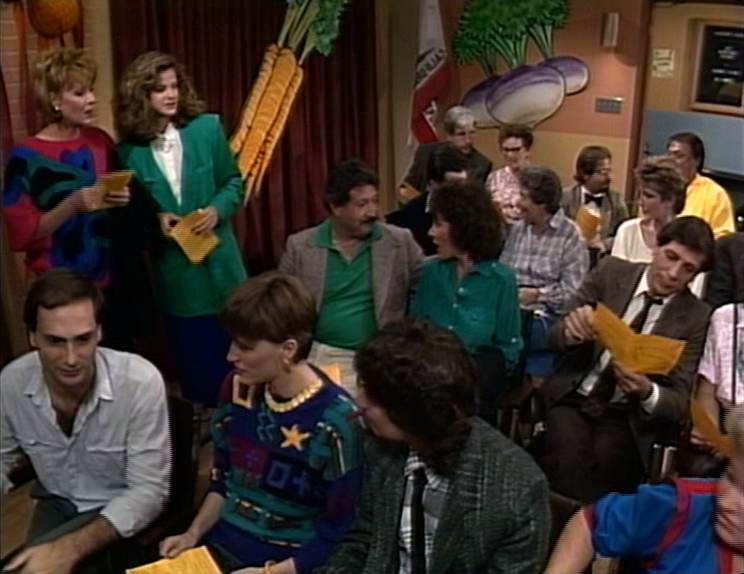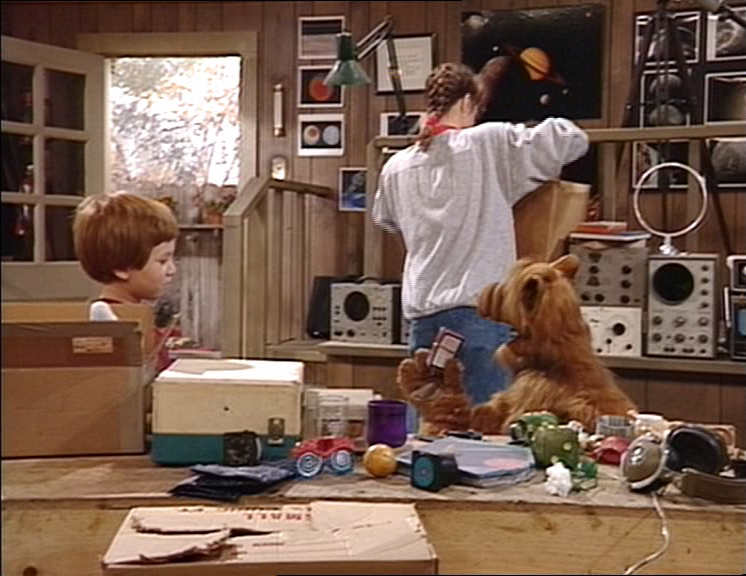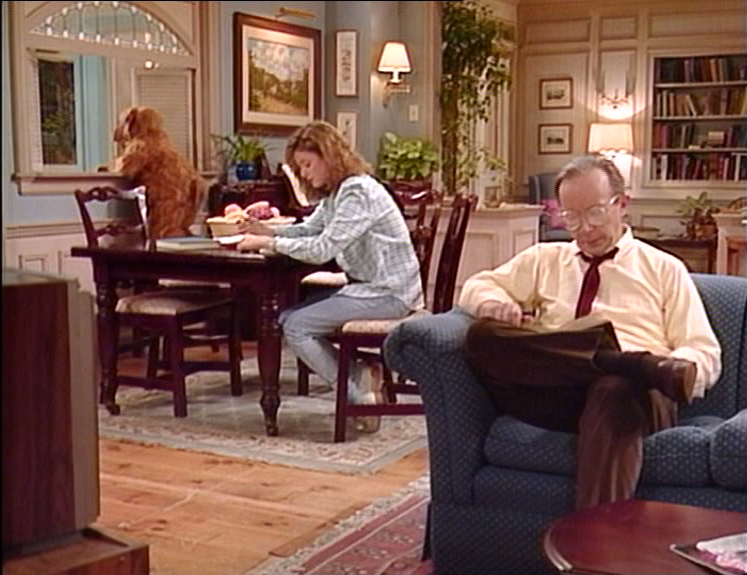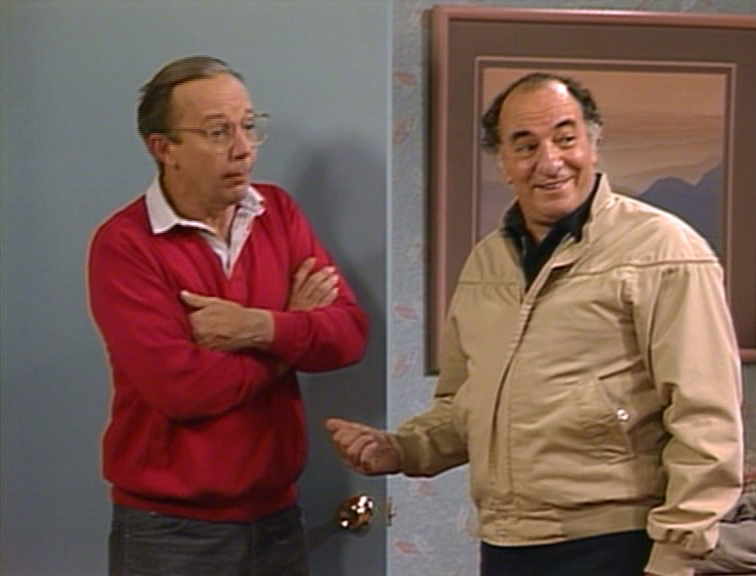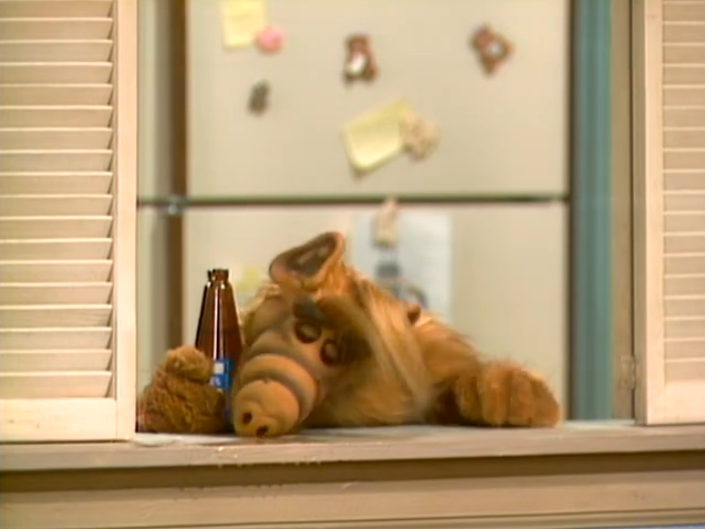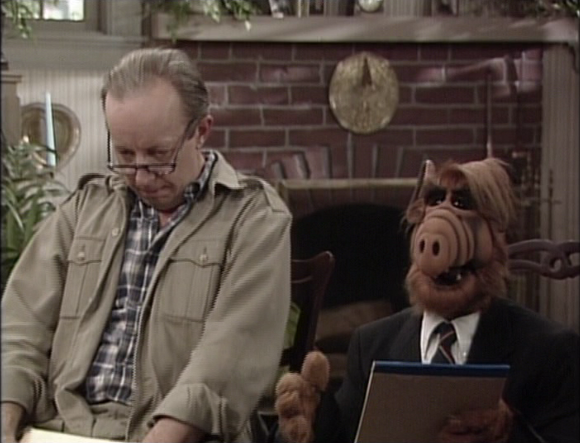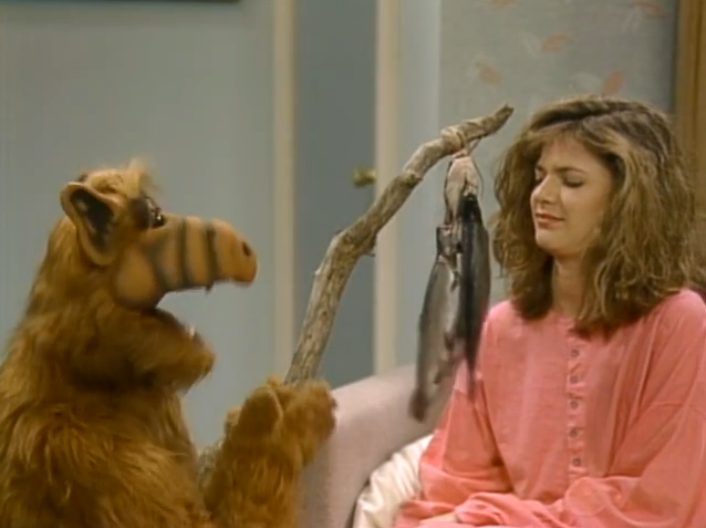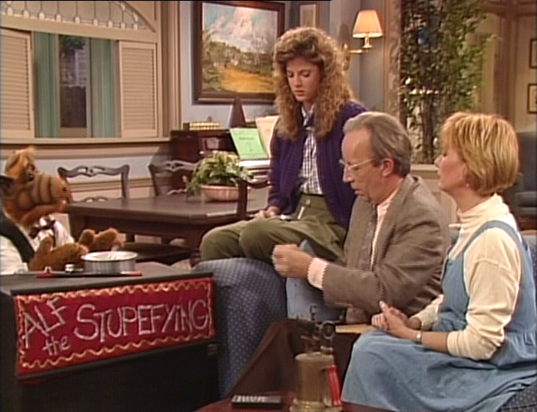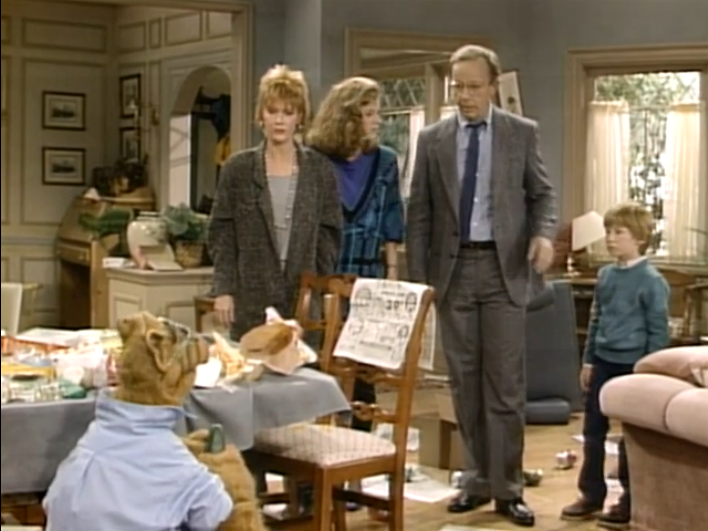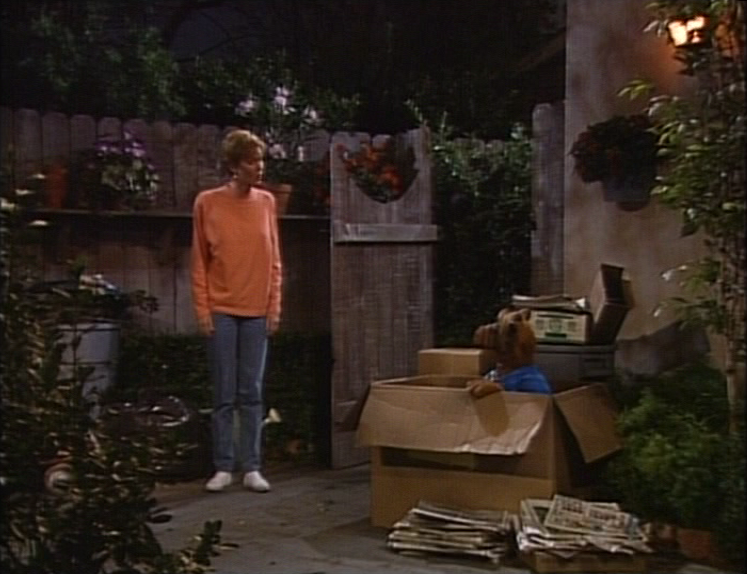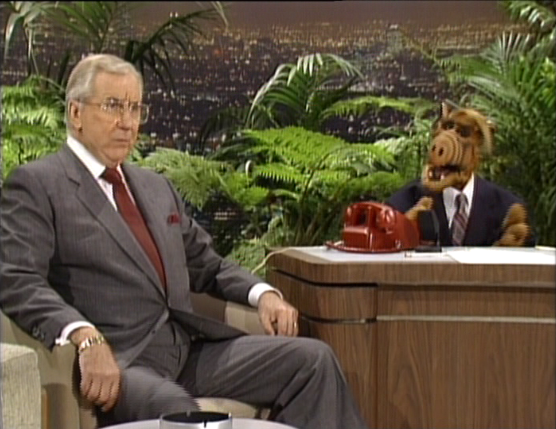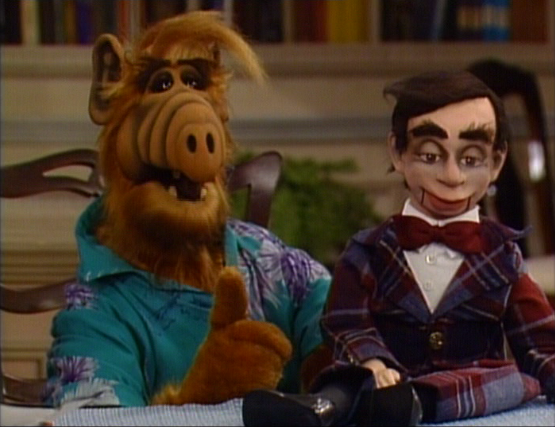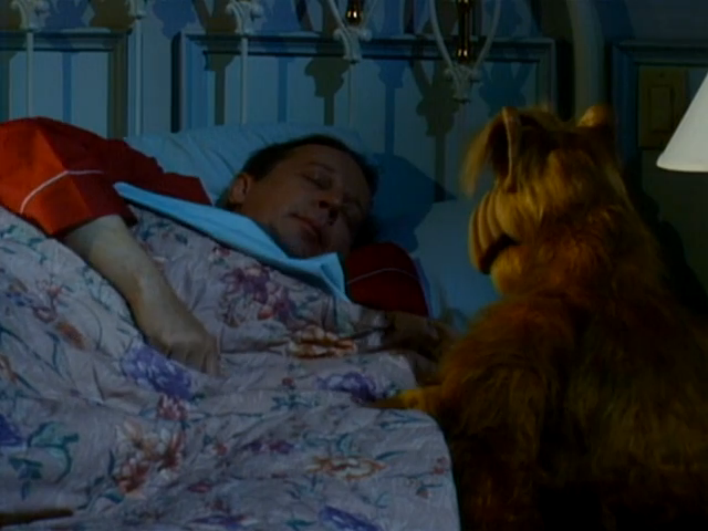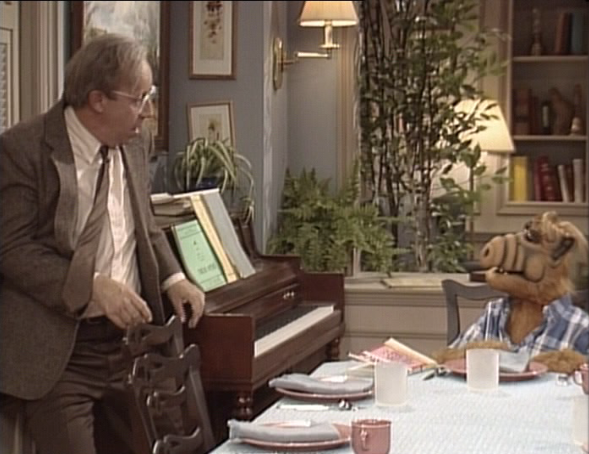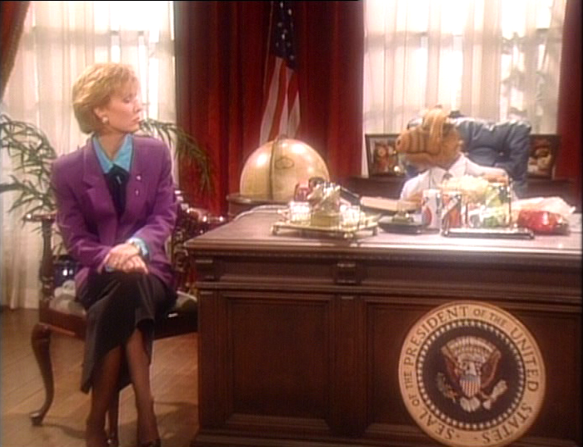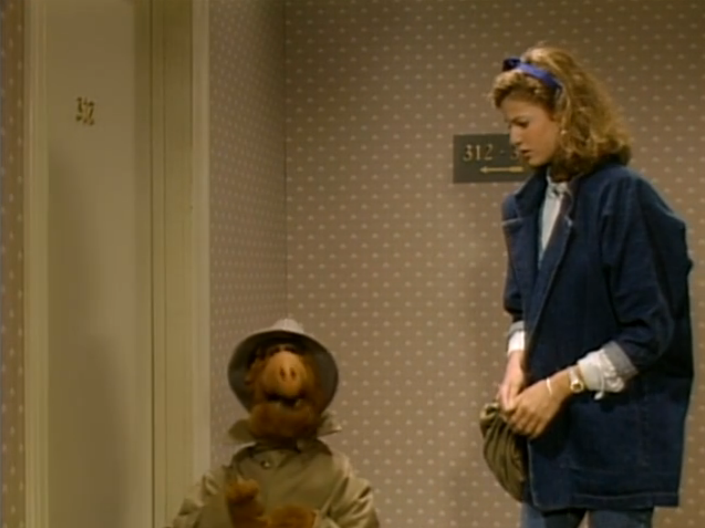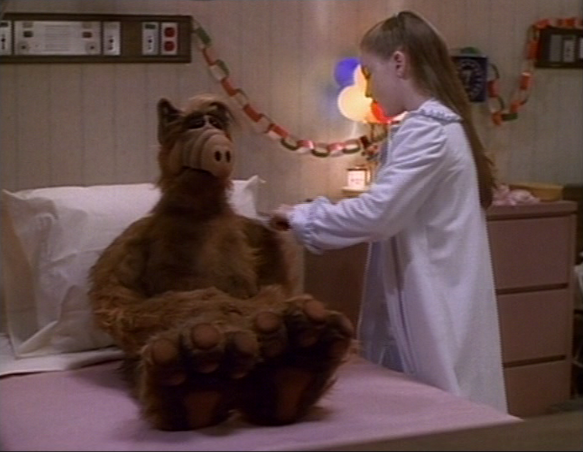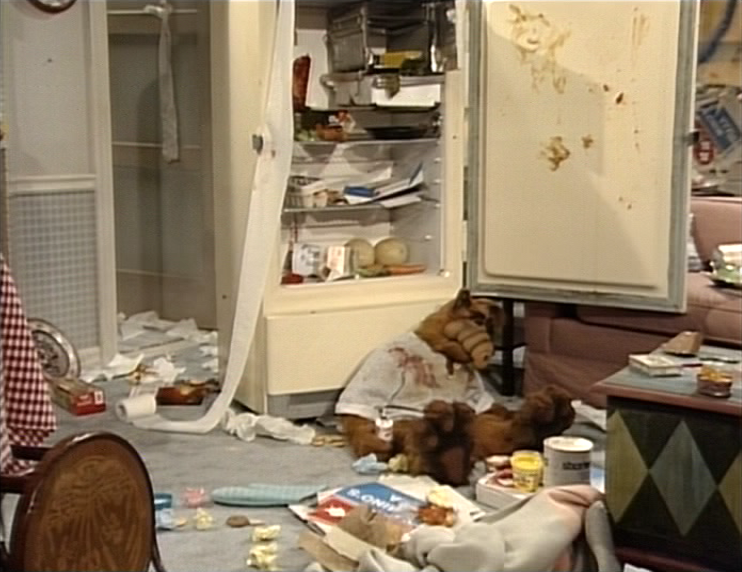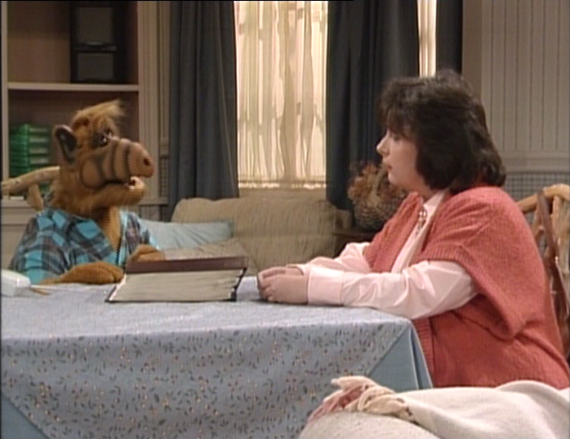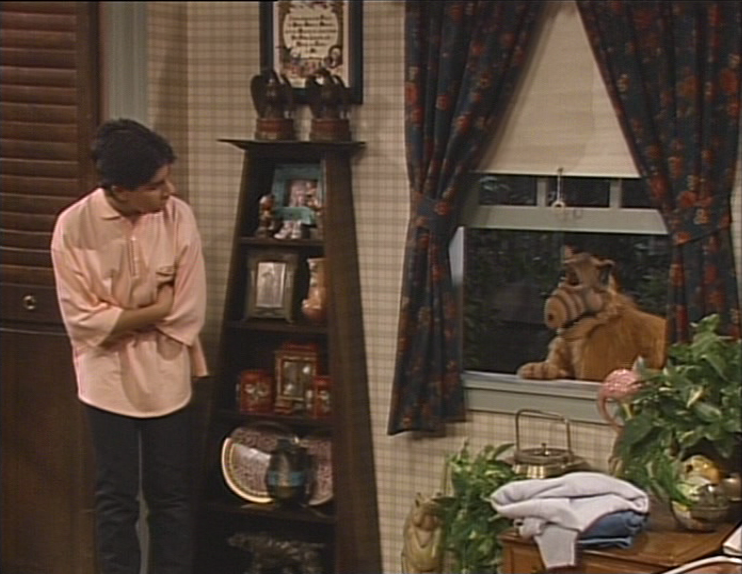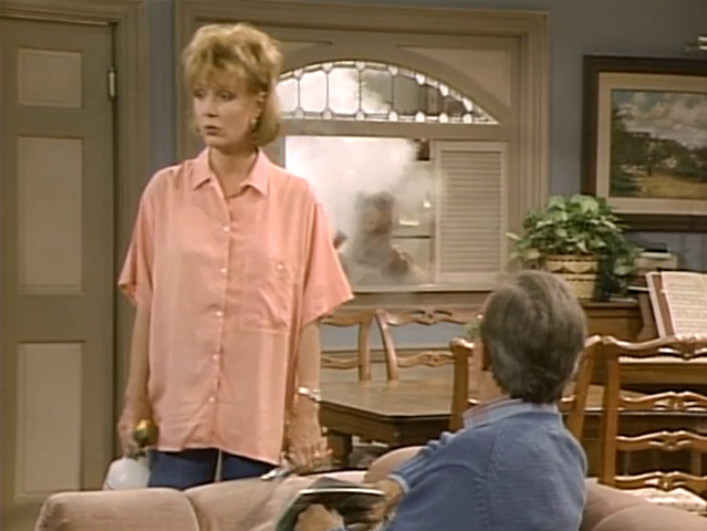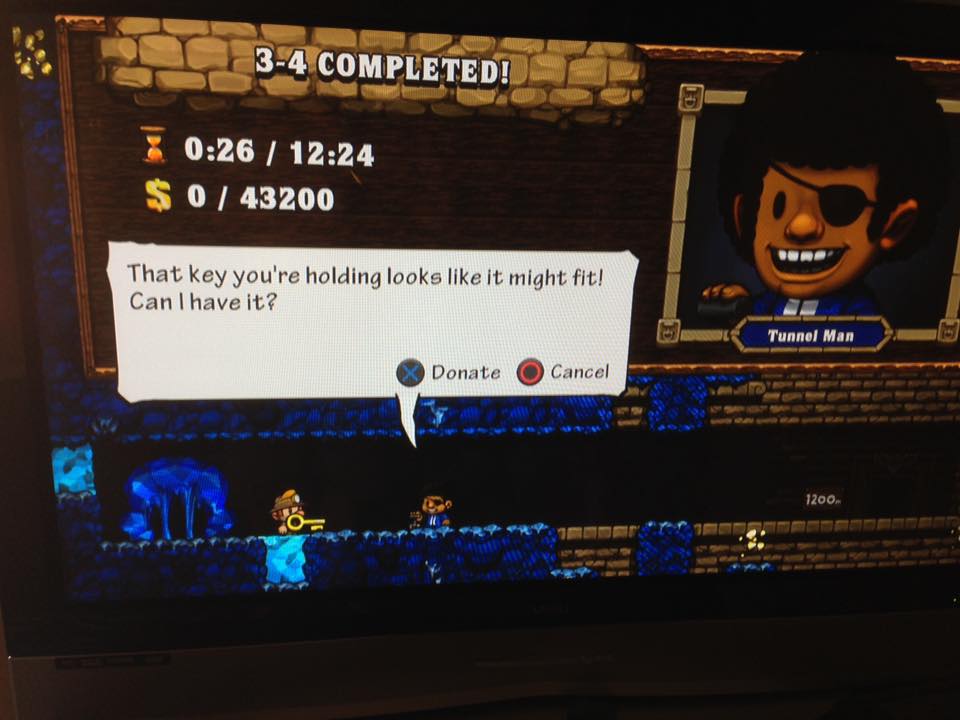The penultimate feature here, folks: the definitive, unquestionable lists of the best and worst episodes of ALF. You are not welcome to disagree, because no other possible opinion can exist. I talked to scientists and everything. Anyway, we’ll get the best ones out of the way first, because I like to end on a curse word.
The 10 Best Episodes of ALF
10) Lies (4-2)
When the best episode of season four is at the very bottom of the list (and even then just barely) you get a great sense of just how awful that final stretch of episodes was. But “Lies” is actually a lot of fun for such a simple premise. ALF sends some of his stories to a tabloid, which then obtains a video of Max Wright sucking off a hobo. It’s up to Willie to distract the reporters while ALF, Brian, and Lynn steal the incriminating evidence. The entire thing takes place in and around the house, but it manages to feel a lot less claustrophobic than most episodes do, probably because we’re at least talking about space and aliens and hey, now that I type that I realize that’s what the whole show was supposed to be about. Crazy! This also marks Eric’s only appearance in the top 10, and if memory serves I’m pretty sure he spent the entire episode gurgling away in the broom closet.
9) La Cuckaracha (1-24)
Speaking of the many times ALF being an alien had something to do with the plot, here’s the only other time ALF being an alien had something to do with the plot. Looking back at “La Cuckaracha” is really odd, as it feels like it comes from an entirely different, much more playful show than ALF actually was. For a sitcom about a sass-mouthed puppet it sure didn’t give a shit about making anyone laugh. But here, for whatever reason, the show let loose a bit, and it was pretty great. Riffing on the “giant animal” sub-genre of sci-fi horror films, “La Cuckaracha” sees ALF and Willie fighting a giant cockroach. And while it’s subject to the same lame jokes, shitty acting, and ramshackle atmosphere as any other episode, those things actually make this one feel more authentic. (Shockingly, giant animal movies weren’t known for their impeccable writing, acting, or special effects.) It’s strange that so little of Melmac made it into this show, but maybe that’s a good thing. It lets “La Cuckaracha” feel like a highlight rather than one silly sci-fi romp among many.
8) Working My Way Back to You (2-1)
ALF is a gigantic motherfucking bitchsack of a racist rapist kiddy-diddling asshole. And, for once, the show acknowledges that that might not be a very fun character to live with. This ends up being a great (and sadly uncommon) Kate episode, as she’s the character most likely to tear ALF’s throat out with her bare hands, which lends his efforts to get back into the family’s good graces a bit of actual tension. The misbehavior that pushes her over the line is a bit weak — he accidentally smashes a painting, which is evidently worse than the times he burned the house down, got Willie arrested, or had their neighbors investigated for murder — but ALF actually having to make amends for something is a nice change of pace. Also, it ends with ALF almost getting killed in a fiery explosion, and frankly that could have been preceded by 20 minutes of static and it still would have made my top 10.
7) Superstition (3-19)
It’s now official: the best thing Brian ever did in an episode of ALF was possess a textbook. (Fun fact: in each of the episodes ranked higher than this one, the part of Brian was played by a pile of baby parts the producers bought from Planned Parenthood.) I didn’t know anything about “Superstition” before going into it, and it ended up being a pleasant surprise. For starters, it’s one of those very rare episodes in which each of the characters gets to participate, rather than stand around the set making faces while ALF performs his one-man show, Give ‘Em Hell, Gordy! But it’s also…pretty funny, actually, with the Melmacian bibliocide ritual being both believable enough and silly enough that the episode’s punchline — in which an elaborate ceremony is staged just so ALF can mumble a brief, general apology — actually lands. “Superstition” is a great exercise in subverting expectations. I’m referring both to the comically underwhelming apology and to the fact that an episode of ALF wasn’t a giant pile of shit.
6) I’m Your Puppet (2-22)
Working with Paul Fusco was an endless, spiraling nightmare of misery…grueling twenty-hour workdays without any recognition or satisfaction or a chance to showcase your talents, during which you were physically endangered by a treacherous network of trenches and had your career destroyed before your very eyes, while a puppet disco danced and screamed racist hate speech at you. Even so, some people didn’t enjoy the experience. Their frustrations were channeled into the script for “I’m Your Puppet,” which was about ALF obnoxiously operating an obnoxious puppet named Paul. The theoretical role reversal here is interesting, but by all accounts ALF and Paul Fusco had identical personalities anyway, right down to their refusal to ever wear pants to work, so maybe we can’t give the show too much credit for that. What we can give it credit for is telling this story in an impressively self-critical manner, the adorable little detail that ALF’s mouth moves when he voices the dummy, and the return of the incredible Bill Daily as Dr. Dykstra.
5) For Your Eyes Only (1-6)
When the first batch of scripts for the show was being written, it must have posed a bit of a challenge to the writers. How is ALF meant to interact with anyone when he can’t afford to have his extraterrestrial origins exposed? Episode six hit upon one of the most obvious answers: somebody he meets is blind. Of course, this was back before the writers threw up their hands and said, “Fuck it, whatever, he can walk down the street juggling and singing showtunes for all we care.” This early in the show’s run things really could have gone either way, and “For Your Eyes Only” was a fleeting glimpse of what the better option would have been. It had heart, a great guest character, and tapped into ALF’s inherent loneliness in a universe that literally rejected his entire species. Tying his emotional state into Jodie’s, and exploring (briefly) the parallels between them, worked wonders, and tricked me into thinking the show would be worth watching more than nine more times.
4) Fight Back (3-14)
Sometimes the reason an episode is good is self-explanatory. (“ALF makes a blind friend.” “The writers bitch about Fusco.” “A giant cockroach sodomizes Willie.”) But “Fight Back” is one that doesn’t sound all that good or interesting on paper. Willie’s car breaks down, his mechanic gyps him, and…that’s it, really. And yet it’s actually a lot of fun, and one of this show’s very uncommon ensemble pieces. Literally every character gets something to do. Apart from Brian, who is explicitly told he’ll get nothing to do, which as far I’m concerned is even better. There’s also a nice thematic splitting point early in the episode, as the same basic problem — a crooked mechanic — is dealt with one way by Willie, and another way by ALF. One tries to take the “correct” way out by reporting the mechanic’s shady business practices, while the other takes action and attempts to catch him red handed. ALF rarely had anything to say, so it stands out when an episode manages not only to say something, but to say it two different ways. It’s a simple episode, but one that I really enjoyed.
3) Going Out of My Head Over You (1-19)
Dr. Dykstra’s first appearance was his best, with an episode that I suspect was born of necessity. Paul Fusco and Max Wright (who played Crackrock O’Reilly) did not get along very well. They had a kind of Roadrunner / Coyote relationship, only instead of engaging in a war of comically overdesigned contraptions they’d stab each other with broken glass. Bringing Bill Daily — a professional in both realities — aboard to help them mitigate the conflict was a great move. ALF and Willie could hash out their differences and learn to live together, while Fusco and Wright, by proxy, could exorcise their frustrations and learn to work together. It led to some great scenes, including passive-aggressive impersonations at the dinner table in which the actors barely seem to hold it together, and the best part is that this experiment actually worked. Paul Fusco and Max Wright got along from this point forward, and the show was great forever.
2) Have You Seen Your Mother, Baby, Standing in the Shadow (3-23)
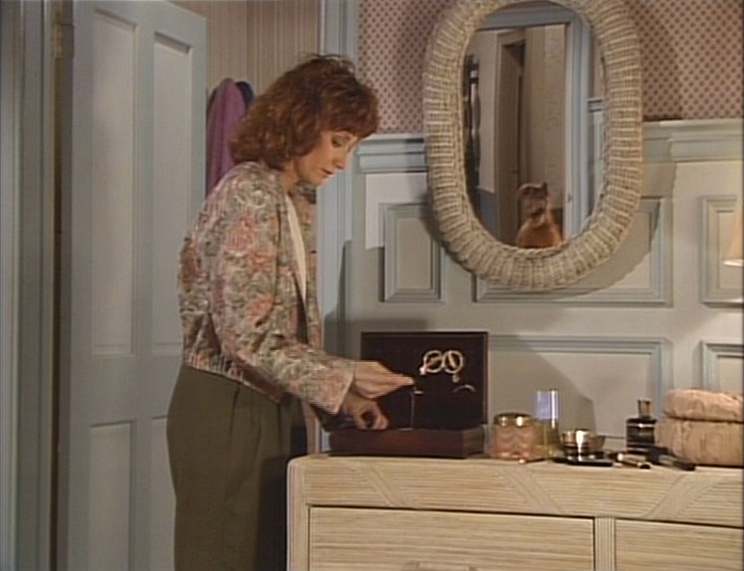
Don’t ask me how ALF managed to handle a touchy subject with something suspiciously like intelligence. I still don’t know. But this annoyingly titled episode was actually pretty…good. And well-acted. And insightfully executed. This was one I dreaded because it tapped into a family problem that I had the misfortune to experience myself. Other episodes that charted territory I was familiar with (whether due to my father’s alcoholism, my elderly uncle’s death after finding an alien in a tent, or that time my wife slept with Joe Namath) were fucking piles of horseshit, to put it politely. But this one was a refreshing break from ALF‘s idiocy, and it ended without unearned moralizing. “Sometimes there are shitty people in your life,” the episode says, “and the only thing you can do is walk away.” For a sitcom, that’s uncommonly good advice. For ALF it’s like parting the Red Sea.
1) Night Train (2-9)
Wow, what a surprise! “Night Train” is the best episode! I bet if you suffered a massive brain injury between that review and today you’ll never have seen that coming. Yes, yes, this was predictable. Who cares. It was a great episode of a show whose normal level of artistic merit is somewhere below watching an old lady tumble helplessly down the stairs. But this one was good, pairing up two characters whose relationship really should have been the heart of the show, and giving us just a taste of what a great version of ALF would have looked liked. ALF and Willie both compare shattered dreams and determine that they’re more grateful for the lives they lead than they realized, even if they’re not the lives they once imagined. Also an irrelevant hobo jumps to his death. It was a sweet episode with some real heart and some good jokes along the way, and the worst thing I can say about it is that it set a high water mark the show was simply incapable of ever reaching again.
The 10 Worst Episodes of ALF
10) Strangers in the Night (1-2)
I remember watching this episode for my review and thinking the show couldn’t possibly get any worse than this. Oh, the follies of youth. In retrospect it’s not that I judged “Strangers in the Night” too harshly…it’s that I failed to predict ALF‘s staggering capacity for brainless garbage. This is the one where Mrs. Ochmonek wants to watch Psycho, so ALF orders a pizza and a robber gets scared. It’s also the second episode of the show, and already the Tanners are hardly in it. I wondered back then why they’d so quickly brush aside four of the main characters. (I was a fucking idiot.) I really have no idea why this was even written, and the narration added during the edit suggests to me that nobody involved with it knew, either. Boy, ALF. You really hit your stride right out of the gate.
9) Hail to the Chief (2-11)
ALF runs for president in a dream but in a different dream he doesn’t but then at the end of another dream he is the president and then in real life he gives advice to actual presidents. CLASSIC SHIT RIGHT HERE. This is one of many episodes that feels like it was cobbled together from scraps, and in this case none of the scraps had any redeeming merit at all. “Hail to the Chief” is like the exact inverse of “Working My Way Back to You.” While that was a great showcase for Anne Schedeen, this one was written to see if they could get her to quit the show. It’s probably no kind of spoiler to say that this is by no means the only fantasy episode in the bottom 10, and I really can’t make this clear enough: as awful as ALF was every fucking week, the fantasy episodes are worse than getting hit by a car and dragged screaming for miles.
8) Don’t it Make Your Brown Eyes Blue? (1-8)
You know, spending a whole episode about how your main character is driven into a sexual frenzy by an underage girl sounds great on paper. What a sure-fire classic. There’s no better comedy staple than the lecherous old molester, and pairing that with a music video in which Uncle Grabby dances around singing about precisely how many ounces of seed he’d like to squirt into her was a recipe for success if there ever was one. Amazingly, bafflingly, defying all knowledge I’ve ever had and ever will have about the universe, it turned out to not be very good. Quite where it went wrong is a mystery for the ages. Surely analyzing any given scene, line, or sequence reveals only masterful construction and flawless execution, but in the end “Don’t it Make Your Brown Eyes Blue?” somehow turned out to be a disappointment. I’ll never understand why it doesn’t work, and neither will you. It’s the single greatest idea in sitcom history, and its presence on this list of lows is a headscratcher even I don’t understand.
7) Wild Thing (1-18)
When I declared “Wild Thing” the worst episode of season one (during the closing ceremonies of ALF Fest ’14) I knew I couldn’t have been entirely fair. In the first place, I was watching syndication cuts. In addition to that, “Wild Thing” seemed to have been hit the mathematical hardest by those cuts. Most episodes seemed to lose around 2-3 minutes of material, while “Wild Thing” lost some crazy amount that I don’t feel like looking up right now so let’s just say a day and a half. But now that I’ve seen it restored to its original glory, I can say conclusively that it was indeed the worst episode of season one, and a massive pile of shit no matter how much you do or don’t hack out of it. So potent was its stench that when it was re-aired during season four (with some minor editing to replace a few instances of the name “ALF” with “Wolf”), I didn’t like it any more than I did here. In fact, consider this dual placement for “Wild Thing” and “Hungry Like the Wolf,” because I’m far too lazy to write up the same fucking episode twice.
6) Tequila (2-23)
“Tequila” is a 1988 erotic romantic drama episode of ALF written by Art Everett and directed by Nick Havinga. It is based on the semi-autobiographical novel by John O’Brien. Kate’s friend Maura is a suicidal alcoholic who has ended her personal and professional life to drink herself to death in the Tanner kitchen. While there, she develops a relationship with a hardened prostitute played by ALF, which forms the center of the episode. O’Brien committed suicide two weeks after principal photography of the episode began.
Goofs: The toilet paper is folded when ALF first sits down to urinate. The next shot of him sitting on the toilet shows that the toilet paper isn’t folded any more.
5) Like an Old Time Movie (3-24)
“What if ALF was a silent movie?” That’s a question nobody’s ever asked, for any reason, at any point in human history. No, not even the people who made the episode. It’s common knowledge that “Like an Old Time Movie” was a script coughed up from the bowels of hell. The writers and cast, after consulting with 1989’s foremost theologians, knew that producing and airing the episode was the only way to preempt Satan’s impending reign over humanity. As such, “Like an Old Time Movie” was a necessary sacrifice for viewers all over the world, but it’s still pretty solid garbage. There were a few comments on the review about how ALF deserves credit for being the only show that did an episode like this, or whatever. Maybe that’s true. Probably not, but I don’t give a shit. If other shows were skipping silent film pastiche in favor making something worth watching, it’s not ALF that deserves credit.
4) Promises, Promises (3-6)
Ugh, “Promises, Promises.” I have to talk about this shit again? Actually, I guess I don’t. Let’s talk about something else. Like what we’ll do after ALF. I’m planning to jump off of a building. How about you guys? If I don’t get around to that, then maybe I’ll do a bunch of Fiction Into Film pieces, since I really enjoyed those but couldn’t get to them because ALF was fisting his way through all of my free time. I’ve also had a few requests to cover some Muppet stuff, and I might do that since I’ve never properly talked about them here. Oh, and I’m working on this year’s Xmas Bash!!!!, which is going to be pretty great, and which — I think — has the best mix of programming yet. Man, every time I remember that the Xmas Bash!!!! is technically a spinoff of the ALF reviews I’m kind of blown away. I never expected that this crap would lead to any genuine good in my life, or anyone else’s. But here we are, raising money for a great cause on what’s genuinely the most fun night of the entire year as far as I’m concerned. So that’s nice! That’s a positive thing! That’s something to focus on instead of talking about “Promises, Promises.” I feel liberated. I feel free. Does the air smell especially sweet to anybody else today?
3) Future’s So Bright, I Gotta Wear Shades (4-18)
the hell is this god damned horseshit garbage pile, for fuck’s sake, my god, just look at this sack of crap nonsensical assload of trash, what kind of moron watches this shit for crying out loud, is there nothing better you could be doing with your time than sitting around pouring catpiss like this into your brain, I mean come on just get out of the fucking house if this is what you’re doing with your time, my frigging god almighty, jesus christ, I can’t think of a worse way to spend 20 minutes, I don’t care if you live to be ten thousand fucking years old there’s no reason to waste any portion of your life gagging down this bullshit episode of a dogshit sitcom for fuckwits, come on this fucking crap my god
2) Consider Me Gone (4-24)
Season four would have been awful even if it didn’t end with a punch in the nuts. As it stands, season four was awful and it ended with a punch in the nuts. “Consider Me Gone” was a sendoff for the Tanners masquerading as a sendoff for ALF, and which turned out to actually be a sendoff for the show as a whole. You’d be forgiven for thinking that this clearly important episode would have had an ounce of effort invested in it. You’d be forgiven, but utterly wrong, you idiot. There’s pretty much nothing of merit in the entire clusterfuck. We spend large portions of the episode with an Alien Task Force outpost on the other coast, populated entirely with characters we’ve never seen before and would never see again, which sucks, but the rest of the time we spend with ALF and the Tanners, which also sucks. It was a necessary milestone for the show as season five would have seen ALF moving to another cast and environment, but the entire thing plays like a shrug, as though nobody who worked on it could muster up the energy it would have taken to even pretend to care. I’ve experienced more meaningful farts. But, hey, at least it laid the groundwork for Project: ALF, right? Speaking of which…
1) ALF’s Special Christmas (2-12)
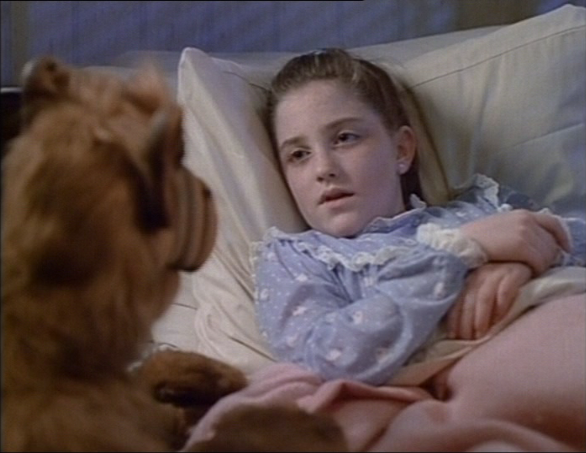
…oh, wait. This isn’t Project: ALF. Shit. I should have actually read the list before writing about it. Well, part of me wants to just say “Project: ALF isn’t an episode, so it can’t take the number one spot.” And I’d be right, because I’m very intelligent. But even if we wanted to count it, the more I think about it the more I really believe “ALF’s Special Christmas” is the worst thing imaginable. (And I’ve imagined some pretty horrible things in my time.) Project: ALF, for all of its impressively varied flaws, was just a comedy movie that failed to make me laugh. “ALF’s Special Christmas” was a cloying, emotionally manipulative dramedy about a dying little girl that failed to both make me laugh and make me weep. It set its sights on a deeply misguided target, and aimed to change lives through the dual magics of Christmas and gynecology. And it ends, as all of the greatest works of art end, with an alien in a Santa suit telling a black guy not to kill himself. Also at some point ALF has to deliver a baby in an elevator, in case you thought you’d be allowed to go five full seconds without Paul Fusco reaching directly into your chest and yanking on your heartstrings. This isn’t just a bad episode of ALF. This is evidence against the existence of God. Tittydrippings.
